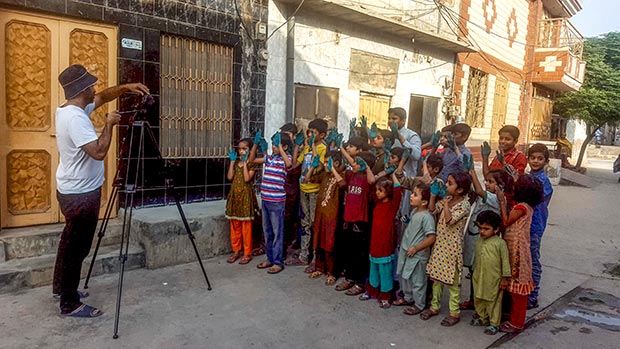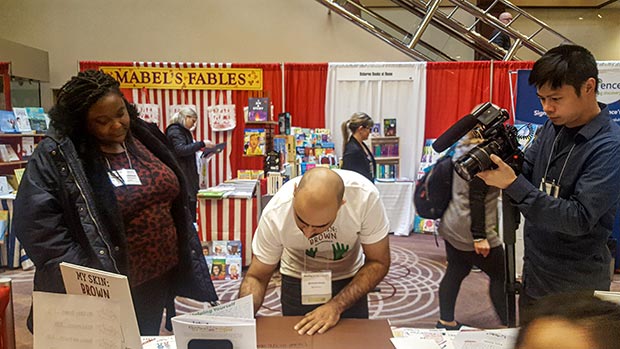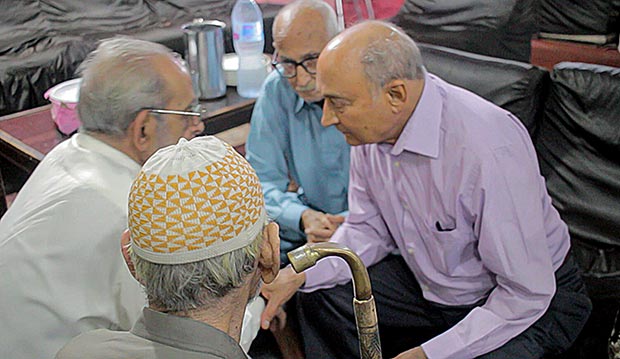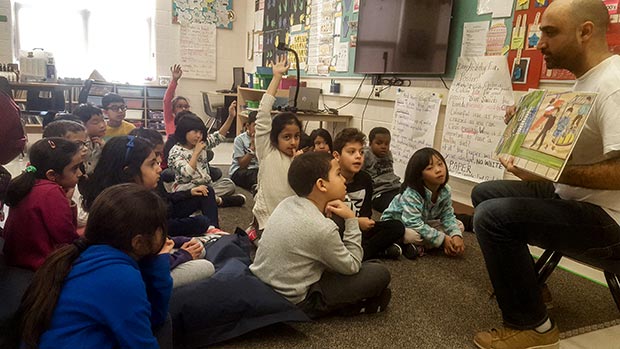
INTERVIEW WITH CANADIAN MULTIDISCIPLINARY ARTIST @STUDENTASIM Giving as Inspiration
Jul 03, 2019 FEATURE, Interview

Producer, author, filmmaker, and artist @studentAsim lives and works in Toronto, Canada. His interactive work explores the theme of Giving to leave behind positive footprints for creating healthier societies. @studentAsim is the author of five children’s books. His fifth children’s book, The Tyer of Ties, was published in February 2019. He is also the producer of The Champion for Life™, an artistic Human Progress concept, and The Champion for Life™ Film, which has played in film festivals internationally. Currently, @studentAsim is producing an online training course for writing children's books, as well as working on several film projects.
I’ve shown my art at tradeshows and conferences in multiple cities in Canada and the United States. I’ve presented in schools and institutions as far as Pakistan. The Champion for Life™ (poster document) has also been exhibited in the Peel Art Gallery Museum in the Greater Toronto Area. A 12-foot mural of The Champion for Life™ was also constructed and exhibited in Faisalabad, Pakistan at the Ghanta Ghar, the historical clock tower built by the British in 1903.
I had no real intention of becoming a multidisciplinary artist per se; it’s just that each project works best in a certain medium. The journey has been organic as one idea presented itself after another. I initially wrote my first book after losing my job. I figured the time was now or never. I had no book writing experience, I literally Googled, “How do you publish a book in Canadaâ€, and that’s how my story started. I used up all my life savings and took the next nine months to write Khadijah Goes to School. The aim was to share a message best suited to children’s literature. Later, after a chance meeting with a customer in a Chicago hotel during breakfast, The Champion for Lifeâ„¢ concept was born. It took the form of a poster, then later a film and a 100-page User Guide, and now an installation —my first— launched in Toronto in June 2019. I also have an interest in film and I have produced some film projects.
 The Champion for Lifeâ„¢ film shoot. Faisalabad, Pakistan, 2015 / Courtesy of the artist
The Champion for Lifeâ„¢ film shoot. Faisalabad, Pakistan, 2015 / Courtesy of the artist
Art, for me, is a vessel for Giving. It’s a way to share experiences in an enjoyable way and it acts as a bridge between me and people. It’s taken a long time to call myself an artist; I like to identify more as a student of art. As a student, the journey and process are important to me. I need to take that journey, and so my work is always a reflection of where I am in my learning. I use this philosophy to explore storytelling in the best ways to make an impact.
One of the outcomes I hope for is bridge-building, but as a Concept Producer, the work I do is more about exploring themes to enhance perspective(s). I think that in order to build bridges, we need to understand different perspectives first. Growing up in Toronto, a Eurocentric viewpoint dominated the status quo and that included education as well. For example, when we say “classics†in literature, why are we only presented with Western classics? There is rich literature from all over the world, yet it remains mostly unknown to us. Ultimately, our perspectives shape how we think of ourselves and others. If we experience the world with limited perspectives, how can bridges be built?
The concept of "Read" for me is an artistic depiction of Progress, which is what Champion for Life™ actively believes in. "Read" is the best-suited theme to represent betterment and human potential. The actual act of reading is just that: learning, becoming aware, and bettering ourselves. In this project, "Read" is so much of my father’s life story and more, in that there are many ways to Progress, and so "Read" represents all of these endless possibilities. In fact, the piece showcases "Read" in over 300 languages. Many people are instantly drawn in, surprised to see so many languages and grapple with a graphic new way to see the world.
 Unveiling the new mural installation The Champion for Lifeâ„¢ Toronto, Canada, 2019 / Courtesy of the artist
Unveiling the new mural installation The Champion for Lifeâ„¢ Toronto, Canada, 2019 / Courtesy of the artist
The Champion for Lifeâ„¢ uses these languages and symbols as actual art to symbolize the vastness and diversity of the world. The art purposely showcases the development of human thought and the power of endless outcomes.
The languages and symbols are stewards for our identities and experiences, and effectively provide a coordinate system into The Story of the World, creating gateways into our lives, our histories, our stories, and so much more. Because each person —whether individually or within a group— interprets these symbols uniquely, many moments of sharing experiences, conversation, and awareness are generated, producing a starburst of learning moments. The point? The Champion for Life™ concept produces new information, new perspectives, a new you—all ingredients of Progress.
Actually, the concept has no fixed format, because it is a concept. Practically though, the current poster documents the most popular embodiment of the concept, displayed in thousands of institutions worldwide. Sometimes, clients want a larger version, and so recently, I've produced an installation for a hallway space in an institution. This is the latest product line now available. It’s remarkable how the organic journey of this concept has produced so many distinct ideas along the way. Additionally, because of its fluid design, I do want museums to be aware of this concept as well. This is why I produced a 12-foot mural in The Champion for Life™ Film. Essentially, this is to show museums what a display like this can look like. I invite museums to contact me. Certainly, the bigger it is, the more power it evokes.
And I honestly cannot do justice to the types of conversations this concept has produced, and the many profound nuanced moments of learning. As the producer, it brings me joy that this is a vessel for others to benefit from so quickly. This concept is truly a tool that is meant to serve and help others see themselves in new ways. I feel grateful when people tweet it out, or when it’s displayed in a public space, in a school, or institution, or even in someone’s home, or office. It truly is a blessing given where all this started: losing my job and turning to the Internet for help, so many years ago.
I am currently working on multiple film projects. I’m exploring the themes of heroism, community, human relationships, and culture, to name a few ideas. Once the films are produced, I aim to have them premiered in film festivals.
 Neighbourhood kids participate in the My Skin Brown film shoot. Faisalabad, Pakistan, 2018 / Courtesy of the artist
Neighbourhood kids participate in the My Skin Brown film shoot. Faisalabad, Pakistan, 2018 / Courtesy of the artist
 Emotional customer receives a signed copy of My Skin Brown. Toronto, Canada, 2018 / Courtesy of the artist
Emotional customer receives a signed copy of My Skin Brown. Toronto, Canada, 2018 / Courtesy of the artist
 On location in Pakistan for upcoming documentary. Faisalabad, Pakistan, 2019 / Courtesy of the artist
On location in Pakistan for upcoming documentary. Faisalabad, Pakistan, 2019 / Courtesy of the artist
That could be one way to think about the story. The pictures are meant to lure the reader into learning more about this time period for themselves, and develop their own interpretations, as many have not studied this era.
I actually had a dream in which I saw a white stone bridge. When I awoke, I knew that the bridge was a medieval bridge and I had an immediate feeling that it was from Al-Andalus (medieval Islamic Spain). I visited Spain to find this bridge, and I saw a white stone bridge like the one in my dream in Cordoba! The bridge and setting, therefore, became essential to the story. For the setting, I spent a lot of time trying to get the artwork right. I worked with an artist from France, and I had to do a lot of research on the medieval setting.
 Book reading with some very curious children. Toronto, Canada, 2019 / Courtesy of the artist
Book reading with some very curious children. Toronto, Canada, 2019 / Courtesy of the artist
You’re welcome. Thank you for this conversation. I look forward to connecting with some of your readers.
Comments
Add a comment